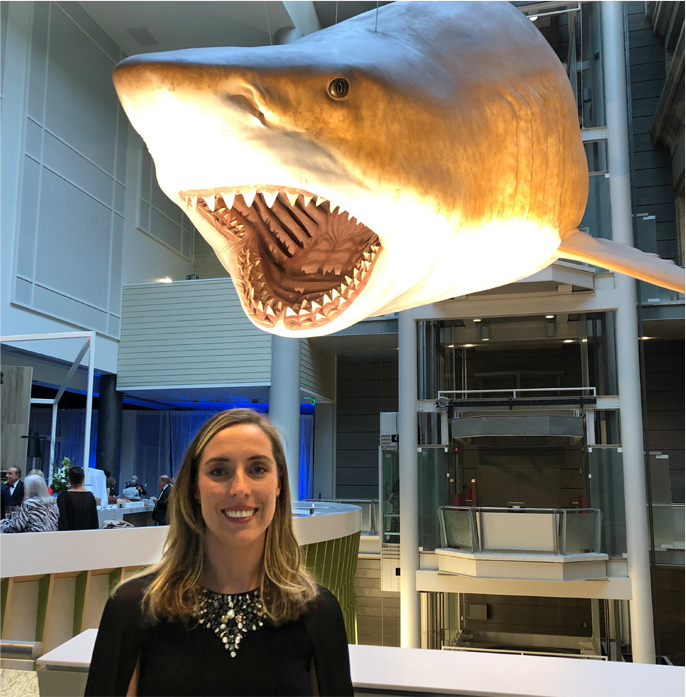Full Text
 |
ELIZABETH CERNY-CHIPMAN, Senior Policy Analyst, Fish Conservation Program, Ocean Conservancy
Degree: When, where, what, and what in?
After completing my bachelor’s degree in biology at Pomona College in 2009, I earned my PhD in zoology at Oregon State University in 2016. My dissertation focused on environmental impacts on predator-prey relationships in a rocky intertidal ecosystem.
Did you stay in academia at all, and if so, for how long?
I didn’t stay long. I had entered graduate school pretty sure I was not headed into an academic career, and I left academia shortly after finishing my degree. I was fortunate to have a short-term postdoctoral position after graduate school that allowed me to wrap up and build upon some of my research before starting my next step in a policy fellowship.
How did you go about searching for a job outside of the university setting?
People in my lab and department had gone into a wide array of careers, so I had good sources to ask about jobs outside of academia. I had always been interested in policy, so I was mostly looking for opportunities in that area while finishing up my graduate degree. When I heard about the John A. Knauss Marine Policy Fellowship, which brings graduate students to Washington, DC, for a year to gain experience working in marine policy, I knew that it would be a really good fit. I also applied to other fellowships and a few postdoctoral positions.
Is this the only job (post-academia) that you’ve had? If not, what else did you do?
As a Knauss Fellow, I worked at the National Oceanic and Atmospheric Administration (NOAA) in the Office of Coastal Management. In that role, I helped bring together information from across programs to share with decision-makers in response to questions or requests. I learned a lot about communications, organizational strategy, and how coastal management and policy work in the federal government.
What is your current job? What path did you take to get there?
I currently work in the Fish Conservation program at Ocean Conservancy, which is an environmental nonprofit with a mission to protect the ocean from today’s greatest global challenges using science-based solutions. As a senior policy analyst, I research and advocate for policies and management practices to support sustainable fisheries in the United States.
My career path has been devoted to finding the sweet spot for me at the interface between scientific research and policy—it definitely hasn’t been linear. I worked in a local think tank after college researching topics such as food taxes and election reform, focused on ecological research in graduate school, and then pivoted to conservation policy work toward the end of my graduate degree and after leaving academia. Working in conservation at a science-based environmental nonprofit was something I had been interested in for a long time, but I took a lot of detours along the way.
What did your oceanographic education (or academic career) give you that is useful in your current job?
I did not focus on fish or fisheries in graduate school, but my education is still very valuable in my position. I took policy-relevant coursework and learned about ocean and coastal conservation issues, which gave me a good background for understanding the context around my work today. I also draw on my knowledge as a marine ecologist to evaluate the how science can support policy solutions. Finding ways to translate scientific research and understanding into effective policies is a big part of my job. Other skills that come in handy from my education are being able to write for different audiences and working collaboratively on projects.
Is there any course or other training you would have liked to have had as part of your graduate education to meet the demands of the job market?
There are a few things. I wish I had considered internships and other on-the-job policy opportunities as a graduate student. Even with some policy coursework under my belt, it also would have been helpful to have taken courses related to political science, marine law, and government. Finally, academic writing is quite different from other types of writing, so it would have been helpful to have taken opportunities to write in other formats.
Is the job satisfying? What aspects of the job do you like best/least?
I love my job! I find a lot of satisfaction in working on fisheries conservation policy. My favorite aspect of the job is using scientific information and other knowledge to analyze and develop new policy proposals. I like being in the middle of the policy action and following developments on Capitol Hill and in the administration, and I appreciate that I get to do a range of different tasks each day. I also greatly enjoy working with colleagues who have different backgrounds in law, communications, government relations, and science. One of the hardest things about this area of work is that progress can be slow, and even good policy efforts often fail—but running ecological experiments in the field prepared me well for handling setbacks and unexpected obstacles.
Do you have any recommendations for new grads looking for jobs?
Don’t hesitate to reach out to people and ask for informational interviews to help you learn about their jobs and career paths. These conversations are not as intimidating as they might seem, and they are great way to connect with people and see what is out there. It is also useful to spend some time thinking about how the skills from your graduate career relate to more traditional workplace skills. For example, graduate research often involves considerable project management, and being a TA means communicating information in ways someone new to a topic can understand. Taking the time to do this sort of translation on a job application can help an employer outside of academia understand your experience and qualifications better.

